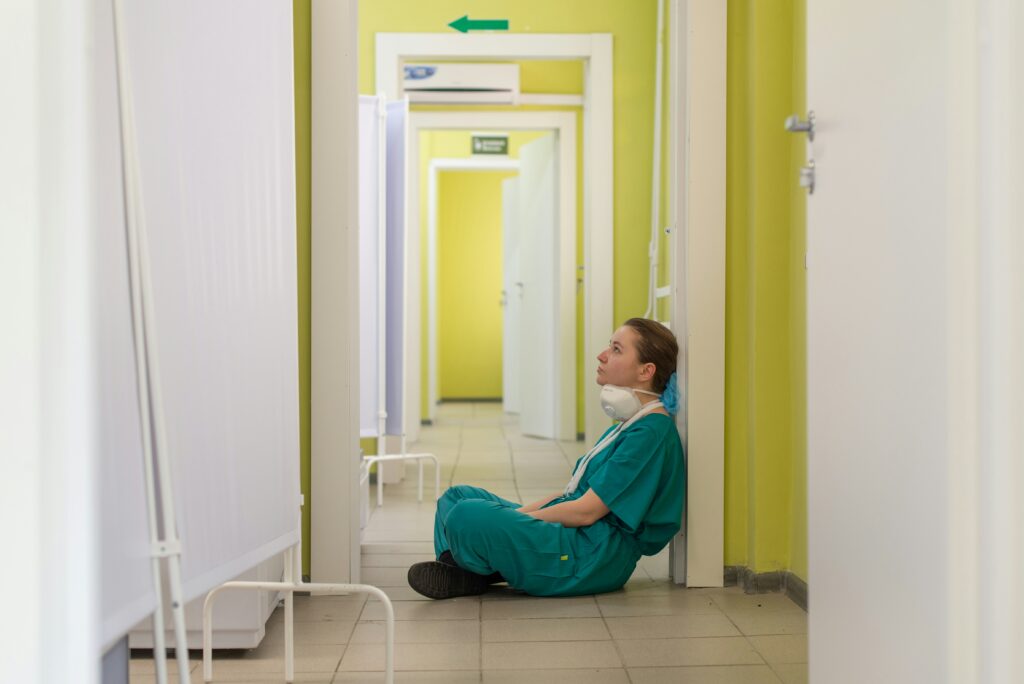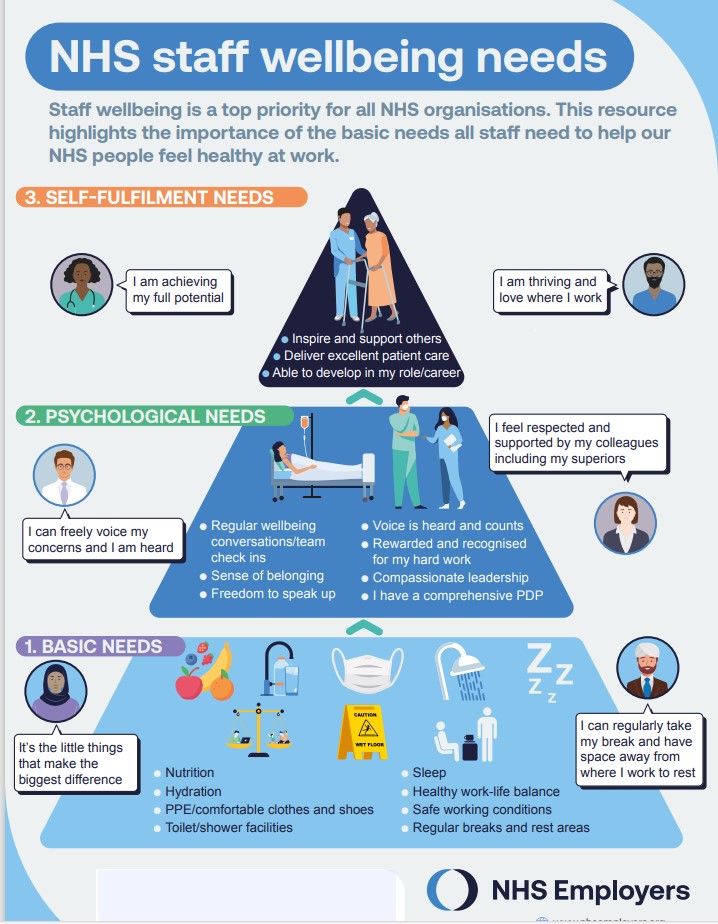#NCW24
Careers in health and care
This year's National Careers Week (4 to 9 March), Kent and Medway Integrated Care System celebrated careers in health and care.
You may have heard there are more than 350 different roles available in the NHS, and more than 30 roles available in adult social care, in direct care roles, management roles, other social care support roles, regulated professional roles and ancillary roles.
Through the academy website, you can also learn how you can develop the skills, knowledge and behaviours that employers need, through apprenticeships, work experience, volunteering, supported internships, T Levels, employability programmes and more.
Why choose a career in health and care?
There are many benefits to choosing a career in health and care. Below you can read what these are while we address some of the most common misconceptions about working in health and care.

“Why would I work in health and care? - public sector roles are paid poorly compared to other industries.”
The NHS is in the public sector, which means the salaries are transparent and equitable. You will not see jobs advertised where “salary is dependent on experience,” or where you don’t find out the salary until after interview or wonder if you are being paid more or less than colleagues.
Salaries in the NHS are based on the Agenda for Change scale. These begin at an entry-level Band 2 role where you will earn £22,383 pa, to the top step point of a Band 9 role which is £114,949, and then VSM (very senior management) roles above this. A newly qualified nurse will typically start at a Band 5 point, earning £28,407, which will then rise to £34,541 after four years in the role. There is also often annual incremental pay lift.
Salaries in adult social care can vary as care providers are often independent businesses, but all organisations will pay at least the national minimum wage.
If you work in health and care, you will also be entitled to annual leave. On appointment in the NHS, staff receive 27 days of leave, plus bank holidays. After five years’ service this increases to 29 days plus bank holidays. After 10 years’ service this increases to 33 days plus bank holidays. The annual leave of part-time or temporary staff is calculated on a pro-rota basis.
As well as annual leave, you will also be entitled to occupational sick pay. You may be entitled to up to six months at full pay and six months at half pay, depending on your length of service.
You will also be entitled to adoption, maternity and paternity leave packages, where you can take up to 52 weeks (one year) of leave as an expectant parent, and one or two weeks paternity leave, paternity pay or shared parental leave and pay if you are the partner of an expectant parent.
If you work in the care sector, you will be entitled to a minimum of the statutory 5.6 weeks’ paid holiday a year, as well as statutory maternity pay (SMP) or statutory sick pay.
In conclusion, health and care salaries are transparent and equitable, and competitive with many salaries offered by private businesses. There are also benefits which supplement the salaries such as the leave packages, and other support which you can read about below.

“I heard NHS staff are overworked and burnt out – it’s a thankless job.”
The NHS and care sectors are the UK’s largest employer – with the NHS alone hiring around 1.4 million people, and caring for the whole of the population, which stands at roughly 67.44 million (2021 consensus.) That means that two per cent of our nation work for the NHS.
At times, working in health or care can be stressful. You are often experiencing people at a desperate, frightening time in their life, when they need the most support. When you join a health or care organisation, you will be provided with the training appropriate to the role so that you are equipped to manage such situations.
In addition, all staff are required to undertake mandatory training upon appointment, such as safeguarding, information governance and data security, quality improvement, fraud awareness, moving and handling, equality, diversity and human rights, fire safety, health, safety and welfare and more. You will also often work within a team of people who will have a wealth of knowledge and experience and will be able to support you when things get tricky.
Health and care organisations also offer continuous personal development (CPD courses,) either through an apprenticeship, or via other training courses such as NHS Leadership Academy or the higher development award. You will be supported to develop the skills that you need to manage all situations at work and understand how to raise a concern through your line manager. All organisations will have a human resources or management team who provide expert assistance to managers and staff members.
In addition, most health providers offer occupational health services to their employees. Occupational health is a specialist branch of medicine focusing on the health of staff in the workplace. OH professionals aim to find out what impact work has on staff health and make sure that staff are fit to undertake the role they are employed to do both physically and emotionally.

The NHS Employee Assistance Programme is available to all colleagues who have had a tough day, who are feeling worried and overwhelmed, or who have a lot on their mind and need to talk it through. This is available 24 hours a day, seven days a week.
Other support programmes include:
- Having safe and effective wellbeing conversations
- Handling difficult situations with compassion
- Staff mental health and wellbeing hubs
- Wellbeing apps
- Supporting colleagues affected by long covid
- Supporting colleagues affected by the menopause
- Financial wellbeing
- Physical health and wellbeing
- Substance misuse and gambling support
- Free confidential coaching and support for primary care workforce
- Support for our armed forces personnel
- Support for health and social care
Health and care professions are often respected, well-recognised and celebrated by people in our greater community. Many retailers and restaurants offer healthcare staff discounts. With the Blue Light Card, you can get discounts at the following places:

Health and care workers are entitled to join a trade union. Trade unions are organisations who represent and campaign on behalf of all groups of staff employed by a organisation. Some of the leading trade unions for health and care are Unite and Unison. If you are a member of a trade union, you can often access free legal services and confidential advice and support about your work or home situations.
Dependent on your role, many employers offer flexible working or home working arrangements where appropriate and will do what they can to support you to maintain a positive work/life balance
In conclusion, working in health and care can be challenging and tough, but it can also be incredibly rewarding and fulfilling, and comes with many benefits and offers. People who work in health and care do so because they want to help people. Almost all of us will need to use a health or care service at some point in our lives, and have met the incredible workers who are resilient, supportive and capable.

“I don’t want to work in a hospital or sit at a desk all day.”
It doesn’t matter where you live in Kent and Medway – there will always be a health or care organisation near you. Visit our Healthcare Structures page to find out more about where you can work in health or care.
Health and care roles aren’t all hospital or office based.
Prefer to be out and about and about and meeting people? Community health services might be a good option for you. They cover a wide range of services and provide care for people from birth to the end of their life, and usually in people’s homes, including care homes. You may have had a health visitor come to your home after the birth of a child or had a district nurse come to support an elderly relative.
Are you less interested in patient care, but like to drive? There are jobs available for ambulance drivers, patient transportation drivers, courier drivers and more.
Like computers, mechanics, electrics and/or engineering? Health and care organisations have large teams to keep everything ticking along – computer systems, health and care equipment, and estates and facilities matters.
Don’t drive? Can’t travel far for work? Primary care and care sector services are available in every town and village. Your local dentist, GP practice or care home are some examples.
No matter what your interests, there is probably a role in health and care that is the right fit for you. Try this careers quiz to see what might work for you.

“I don’t have GCSE’s, A-Levels or a clinical degree.”
Contrary to popular belief, you do not need to have a clinical degree, a-levels, or even GCSE’s, to start your career in health or care. All that matters is that you develop the skills, values, behaviours, and knowledge that employers need.
How do you do this?
Many roles require you to have either a specific qualification or the equivalent experience. Many of us develop soft skills required to be successful in employment through everyday life – whether caring for a family member, team working whilst playing sports, resolving conflicts between friends, learning how to manage your schedule and prioritise your workload through running a household.
Even if you do not have GCSE’s, you can gain a qualification in functional skills for maths and english and undertake a Level 2 apprenticeship (which is equivalent to GCSE standard.) This way, you can earn while you learn, develop skills and a qualification, and there will often be a job available once you complete your apprenticeship.
Did you know that you can become a nurse without accruing student debt, and earn money whilst you qualify?
The nursing degree apprenticeship trains people to become a graduate registered nurse through an apprenticeship route. You will be hired through an employer who will use their levy to release you to study part-time in a higher education institution and train in a range of practice placement settings. You will learn at Nursing and Midwifery Council (NMC) approved education providers and will be expected to achieve the same standards as other student nurses.
T Levels in health, science, and other areas (such as digital, business and administration or catering and hospitality) are also a great option. They are equivalent to 3 A-Levels and you will spend time on placement so that you can experience a real healthcare environment and learn from those already working in health and care.
Visit the Career Pathways page to learn more about how you can build upon the skills you already have to become work-ready.
“I'm disabled or have a learning difficulty so I can't work in healthcare.”
Health and care employers are committed to supporting those who have health conditions or impairments.
Most health and care organisations have an Equality, Diversity and Inclusion Lead (EDI Lead) who will provide advice and support to all departments, senior managers and services. The EDI leads have expertise and specialist knowledge to ensure the organisation is compliant with its statutory duties, including the corporate, legal and statutory objectives (Equality Act 2010, Equality Delivery System (EDS2), Workforce Race Equality Standard (WRES) and the Workforce Disability Equality Standard (WDES)).
Most organisations offer reasonable adjustments, additional resources and more to achieve the NHS Workforce Disability Equality Standard.
Want to find out more?
Now you understand more about the benefits of working in health and care. Explore the Academy website to find out more about what careers are available and how you can get involved. You can take the careers quiz or visit the industry insights page to hear from those who work in health and care, doing the job day to day.
If you would like to hear from Kent and Medway's incredible apprentices, head over to the apprenticeships section where you find information about doing an apprenticeship in health and care.
We want to hear from you
Speak to someone in the Academy team to hear about what it is really like to work in health and care or to answer any questions you may have.
